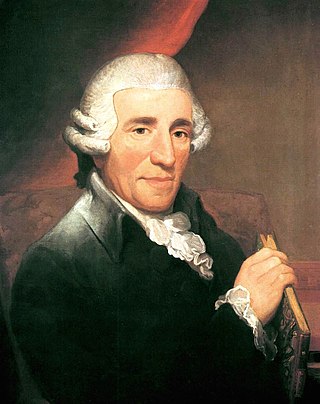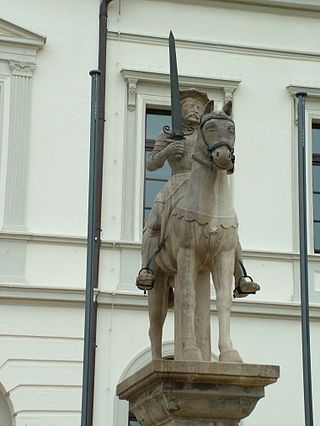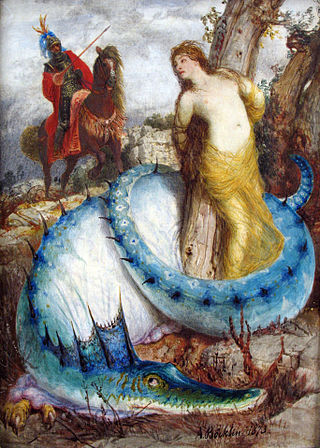
The hippogriff or hippogryph, is a legendary creature with the front half of an eagle and the hind half of a horse.

Orlando furioso is an Italian epic poem by Ludovico Ariosto which has exerted a wide influence on later culture. The earliest version appeared in 1516, although the poem was not published in its complete form until 1532. Orlando furioso is a continuation of Matteo Maria Boiardo's unfinished romance Orlando innamorato. In its historical setting and characters, it shares some features with the Old French La Chanson de Roland of the eleventh century, which tells of the death of Roland. The story is also a chivalric romance which stemmed from a tradition beginning in the late Middle Ages and continuing in popularity in the 16th century and well into the 17th.

Alcina is a 1735 opera seria by George Frideric Handel. Handel used the libretto of L'isola di Alcina, an opera that was set in 1728 in Rome by Riccardo Broschi, which he acquired the year after during his travels in Italy. Partly altered for better conformity, the story was originally taken from Ludovico Ariosto's Orlando furioso, an epic poem. The opera contains several musical sequences with opportunity for dance: these were composed for dancer Marie Sallé.

Renaudde Montauban was a legendary hero and knight which appeared in a 12th-century Old French chanson de geste known as The Four Sons of Aymon. The four sons of Duke Aymon are Renaud, Richard, Alard and Guiscard, and their cousin is the magician Maugris. Renaud possesses the magical horse Bayard and the sword Froberge.

Orlando, usually known in modern times as Orlando furioso, is an opera in three acts by Antonio Vivaldi to an Italian libretto by Grazio Braccioli, based on Ludovico Ariosto's epic poem Orlando Furioso. The first performance of the opera was at the Teatro San Angelo, Venice, in November 1727. It is to be distinguished from an earlier Vivaldi opera of 1714, Orlando furioso, set to much the same libretto, once thought to be a revival of a 1713 opera by Giovanni Alberto Ristori but now considered by Vivaldian musicologists to be a fully-fledged opera by Vivaldi himself.

Maugris or Maugis was one of the heroes of the chansons de geste and romances of chivalry and the Matter of France that tell of the legendary court of King Charlemagne. Maugis was cousin to Renaud de Montauban and his brothers, son of Beuves of Aygremont and brother to Vivien de Monbranc. He was brought up by Oriande the fairy, and became a great enchanter. He won the magical horse Bayard and the sword Froberge which he later gave to Renaud.

Bradamante is a fictional knight heroine in two epic poems of the Renaissance: Orlando Innamorato by Matteo Maria Boiardo and Orlando Furioso by Ludovico Ariosto. Since the poems exerted a wide influence on later culture, she became a recurring character in Western art.

Atlantes was a powerful sorcerer featured in chansons de geste. In Boiardo's Orlando Innamorato (1482), where he is known as Atalante, the magician fears that Rugiero will convert to Christianity and aid Charlemagne against the Saracens. To prevent this and forestall Rugiero's death, he constructs a magic garden ringed by glass on Mt. Carena in the Atlas Mountains, after which he is named. In Orlando Furioso, Atlantes' magical castle is filled with illusions, in order to divert Ruggiero from what he has foretold as certain doom. Ruggiero is later set free by Bradamante and after numerous trials and quests sires a great line of heroes. He later dies betrayed fulfilling the destiny foretold by Atlantes.

Ruggiero is a leading character in the Italian romantic epics Orlando Innamorato by Matteo Maria Boiardo and Orlando Furioso by Ludovico Ariosto. Ruggiero had originally appeared in the twelfth-century French epic Aspremont, reworked by Andrea da Barberino as the chivalric romance Aspramonte. In Boiardo and Ariosto's works, he is supposed to be the ancestor of Boiardo and Ariosto's patrons, the Este family of Ferrara, and he plays a major role in the two poems.
Brunello is a character in the Italian romantic epics Orlando Innamorato by Matteo Maria Boiardo and Orlando Furioso by Ludovico Ariosto. Brunello is a dwarf and a cunning thief who works for the Saracen army of King Agramante. He first appears in the second book of Orlando Innamorato where Agramante intends to invade Europe and defeat Emperor Charlemagne. He has been told he has no chance of success unless he has the young warrior Ruggiero on his side, but Ruggiero has been hidden in a secret garden by the wizard Atlante and the only way to reach him is by using the magic ring belonging to Princess Angelica. Brunello undertakes to steal it and sets off for the fortress of Albracca where he not only manages to snatch the ring but also robs King Sacripante of his horse and the female warrior Marfisa of her sword. Marfisa sets off in pursuit but Brunello evades her and gives the ring to Agramante, who rewards him with a kingdom. The Saracens find Ruggiero at Mount Carena where they see him behind a wall of glass. However, the wall is too steep and slippery to climb, so Brunello suggests they trick Ruggiero out. He gets them to play war games in the plain beneath the mountain. Ruggiero, with his inherent love of combat, cannot resist and despite Atlante's pleas he leaves the garden and begs Brunello for his horse and armor. Brunello only agrees if he will join their expedition against France, to which Ruggiero happily consents.

Marfisa is a character in the Italian romantic epics Orlando innamorato by Matteo Maria Boiardo and Orlando Furioso by Ludovico Ariosto. She is the sister of Ruggiero but was separated from him in early childhood. She becomes queen of India and fights as a warrior for the Saracens, taking part in the siege of the fortress Albracca until her sword is stolen by Brunello. She falls in love with Ruggiero, unaware who he is until Atlantes reveals their background. Learning that her parents were Christian, she converts to the faith and joins the Emperor Charlemagne's army against the Saracens.

Orlando paladino, Hob. 28/11, is an opera in three acts by Joseph Haydn which was first performed at Eszterháza on 6 December 1782. The libretto by Nunziato Porta is based on another libretto, Le pazzie d'Orlando, by Carlo Francesco Badini, itself inspired by Ariosto's epic poem Orlando furioso. The opera was described as a dramma eroicomico and the plot mixes heroic and comic elements. It was Haydn's most popular opera during his lifetime. While in Prague, Mozart conducted a few performances of the opera. The Pennsylvania Opera Theater presented the United States premiere of the work at the Trocadero Theatre, Philadelphia, in March 1982 with John Gilmore in the title role. More recently, staged performances have been given in 2009 at the Berlin State Opera with René Jacobs conducting, and in 2016 at the Zurich Opera House conducted by Gianluca Capuano. In 2023, Il Giardino Armonico conducted by Giovanni Antonini gave concert performances at the Gran Teatre del Liceu and the Teatro Real, with cast including Emőke Baráth, Nuria Rial, Alasdair Kent and Josh Lovell.

The Paladins, also called the Twelve Peers, are twelve legendary knights, the foremost members of Charlemagne's court in the 8th century. They first appear in the medieval chanson de geste cycle of the Matter of France, where they play a similar role to the Knights of the Round Table in Arthurian romance. In these romantic portrayals, the chivalric paladins represent Christianity against a Saracen (Muslim) invasion of Europe. The names of the paladins vary between sources, but there are always twelve of them led by Roland. The paladins' most influential appearance is in The Song of Roland, written between 1050 and 1115, which narrates the heroic death of Roland at the Battle of Roncevaux Pass.

Il Palazzo incantato or Il Palagio d’Atlante, overo La Guerriera Amante, or also Lealtà con valore is an opera in a prologue and three acts by the Italian composer Luigi Rossi. The libretto, by Giulio Rospigliosi, the future Pope Clement IX, is based on Ariosto's Orlando furioso. It was first performed in Rome in a lavish production at the Teatro delle Quattro Fontane on 22 February 1642. Rossi was criticised for giving too much music to his friend, the castrato Marc'Antonio Pasqualini, who played Bradamante, at the expense of the other roles. Some of the highly complicated stage machinery failed to work during the performance. Revived by Opera Dijon in a January 2021 online production.
Agolant or Agolante is a fictional character in Medieval and Renaissance romantic epics dealing with the Matter of France, including Orlando innamorato by Matteo Maria Boiardo and Orlando furioso by Ludovico Ariosto. He is a Saracen king from Africa.

Veillantif (French), Vielantiu ; Vegliantin, Vegliantino or Brigliadoro (Italian) is the name of Roland the paladin's trustworthy and swift steed in the stories derived from the chansons de geste. The French name comes from an expression meaning "vigilant". Veillantif is first mentioned in The Song of Roland.

Melissa is a fictional good sorceress in the Matter of France. She is said to have been an apprentice of Merlin and guards his tomb, though she does not appear in older stories about him.

Roger Freeing Angelica is an oil painting executed in 1873 by Swiss symbolist painter Arnold Böcklin. The painting illustrates a scene from Ariosto's epic Orlando Furioso, in which the Muslim knight Roger saves the pagan princess Angelica from a sea monster. The motif is closely related to the mythological theme of Perseus saving Andromeda.

Mandricardo is a character from the Matter of France, featured in the Italian romantic epic poems Orlando innamorato by Matteo Maria Boiardo and Orlando furioso by Ludovico Ariosto.

Astolfo's rail is an extinct species of flightless bird in the Rallidae, or rail family. It lived in Rapa Iti, one of the Bass Islands in French Polynesia.




















